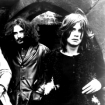Glenn Danzig got into metal early, as the first kid in his Lodi, New Jersey, neighborhood to discover Black Sabbath's 1970 debut album, and he quickly spread the word. He was already a hardcore rock & roll fan, absorbing anything from Elvis Presley to the Velvet Underground, and was just a few years away from playing in his first garage bands. It's the foundation for his four decades of work singing in the Misfits, Samhain and his main outlet, Danzig.
In this latest collection of outtakes from Revolver's career-spanning cover story, the singer talks about discovering a new band called Black Sabbath at a local record shop, witnessing the Runaways at CBGB, and his path to becoming one of the most distinctive singers in punk and metal, and what he's learned along the way.
YOU DISCOVERED BLACK SABBATH EARLY?
GLENN DANZIG I turned everybody in my neighborhood on to Black Sabbath. I used to go to every week to Sam Goody's and they always had a new releases pile. I see this record and it's the first Black Sabbath record and it's got the girl in the electric forest and it says "Black Sabbath." I just pulled it out and I was like, "This thing has to be good." The cover is the most satanic thing you've ever seen. I'm buying this record.
I played it when I got home and I was like, this is incredible. So then I took it around my neighborhood and started playing it for all my friends, saying, "You got to hear this record, you've got to hear this band." Nobody knew who the fuck Black Sabbath was. The big radio stations were not playing them. I guess a lot of other people had found out about the record in other areas, and it eventually just snowballed. I remember they played in my neighborhood at some movie theater – but for that night it was turned into a concert venue for Black Sabbath. And then they played again in Hackensack at another old movie theater. Within a matter of two or three years they were playing arenas.
AND WHAT WAS THE FIRST TIME YOU SAW THEM?
I think it was finally when they came around for Masters of Reality.
SO THAT'S SABBATH AT ONE OF THEIR PEAKS.
I remember I was disappointed at the live show because Ozzy stood off to the side and was very shy and he just kind of clapped his hands. He didn't really go crazy, so he wasn't really like a frontman like Elvis or Alice Cooper. He was more reserved. Tony Iommi was front and center and he didn't really go crazy. Geezer, on the other hand, was the whole show for me. I just watched him because he was going out of his mind. He was the most energetic and he's playing bass like a motherfucker with long, long hair.
WITH YOUR OWN MUSIC, DO YOU GET MORE SATISFACTION OVER THE LARGER SCOPE OF AN ALBUM THAN ONE-OFF TRACKS?
Yeah. I just try to do the best record I can. I'll weed out the stuff before I show Tommy [Victor, guitarist] or Johnny [Kelly, drums]. I only bring down the best songs and then the ones that work in the studio, we keep working on. The ones that don't, I just toss into the bin, so it's really a weeding out process. Once we get the recording stage, you know right away if something's working or not. If it's worth saving, we'll work on it.
YOU MUST HAVE A LOT OF REJECTS IN THE VAULT.
That's why we did The Lost Tracks of Danzig record. That was stuff that was recorded but never finished or got finished and we just didn't think it was good enough to be on a record. And after so many records I was like, "I have all this stuff." And people would ask about them.
THE TIME BETWEEN ALBUMS HAS GROWN LONGER. IS THERE A REASON FOR THAT?
I take my time now to record. Even when we were with Rick Rubin, we put out a record every two years or every two and a half years. Now it's just a little longer. So in between Death Red Sabaoth and Black Laden Crown, I put out my covers record [2015's Skeletons], but that's not technically a real Danzig record – it's just me covering other people's songs. It was something I had been planning on doing since I was in the Misfits. On "Devil's Angels," I used my original arrangement from 1979. It was something good to get out of my system.
A SONG YOU RECORDED FOR SKELETONS WAS A DUET WITH CHERIE CURIE OF THE RUNAWAYS ON "SOME VELVET MORNING," WHICH HAD BEEN A 1967 HIT FOR NANCY SINATRA AND LEE HAZLEWOOD, BUT YOU WEREN'T ABLE TO INCLUDE IT.
You can hear it on YouTube. The Lee Hazlewood estate wouldn't let us use it because we changed some lyrics and whatever, but it's really good. Cherie came down and did a another cover with me, for Patsy Cline's "Walkin' After Midnight." Cherie's super cool and she's a really good singer.
SHE STARTED MAKING MUSIC AROUND THE SAME TIME AS YOU DID?
Maybe a little earlier. I was still in the garage when the Runaways started around '75, I think. That's right when I was putting together the original Misfits pre-Jerry [Only]. I remember seeing them at CBGB.
WHAT IMPRESSION DID THE RUNAWAYS LEAVE ON YOU THEN?
They got a bad rap. I thought they were much better than people give them credit for. People in New York have that kind of "show me" attitude and they always have. The place was packed so they were all full of shit, because they obviously wanted to see the Runaways. Later on, people loved it but I don't think that they got credit for a lot of stuff. They certainly opened the door for all-girl bands to be taken seriously or kind of seriously. With the right producer they would have been much punkier. I don't think Kim Fowley was the right producer for them.
DO YOU EVER GET ANY KIND OF CREATIVE BLOCK?
No. I just don't do a record until I'm ready to do it. I work on stuff now over a period of time and just go into a studio for seven days and do a record. I got an idea and I'll call my engineer and say let's go in and cut a track or something. And if Johnny's not around I'll see what other drummer is and sometimes I'll just do drums myself so it doesn't matter to me. I've been doing it my whole life.
YOU WERE A DRUM TECH EARLY ON?
When I was a little kid, I was a roadie. There was no "tech" back then. I was a drum roadie. Just some local band – an ego thing for these people. They were just playing a local dance and they had people setting their shit up. I was 12 or 13.
WAS THAT ENCOURAGING OR DISCOURAGING?
Discouraging. The guy was an asshole and eventually I quit, but before I quit I peed all over his drums. He was a dickhead.
AT SOME POINT YOU DECIDED, YOU WANT TO DO THIS.
I tried to be a bass player in a band. But eventually some people heard me singing. We're all out, going crazy, doing shit. They're like, "Wow, Glenn can sing." So they asked me to come down and try out as a singer for the band. I was this little kid and this big voice came out, and they were like, "Whoa, you've got the job."
DID YOU ALREADY KNOW YOU HAD THAT VOICE?
It was there. I knew I could sing, but once I got in the band, I realized.
AND THEN YOU GOT GOOD AT IT.
Really good. Real quick. In the beginning, you're still learning. I had to learn how to not blow my voice out over time, which is tough. Even in the beginning of Danzig, I realized you can't play five, six nights in a row and sing the way I sing and not blow your voice out. So you got to start learning how to do it. And then I realized why bands like Black Sabbath or the Who would only do two shows and then they took a day or two off. The singer's voice as to heal up. If a guitar player breaks a string, you just put a new string on it. You can't restring your voice. Once you fuck it up, you've got to wait for a day. Heal. It's an organic piece of muscle tissue. Learning all that stuff is key.
A FEW YEARS AGO, I TALKED WITH CHRIS CORNELL ABOUT SINGING, AND HE SAID WHATEVER TECHNICAL RANGE HE LOST AS HE GOT OLDER WAS MORE THAN MADE UP IN INCREASED ABILITIES AND SKILL. DO YOU AGREE WITH THAT?
I feel the same way about all musicians. There is definitely something to be said about chops, which is road experience and studio experience and just experience in general. So I agree with a lot of that: There's nothing like having experience. So if I got somebody in my band and they've got tons of experience like Tommy, there's no replacement for that. You have to learn that and that's from years of being in the studio and on the road and paying your dues. That's why old blues guys can just pick up a guitar and play the simplest riff in the world, but make it sound 10 times better than anyone else playing it. They have experience and the confidence. Confidence is everything. For a singer, phrasing is everything. If you don't have phrasing, you ain't got shit. I don't care how good your voice is.








